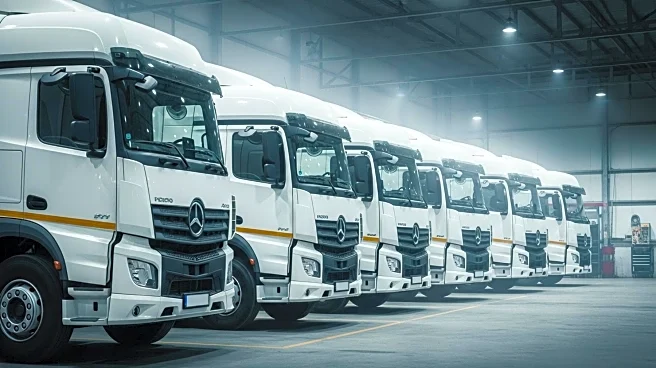What is the story about?
What's Happening?
Private fleets are demonstrating resilience in the face of a prolonged freight recession, according to the National Private Truck Council's Benchmarking Survey Report. These fleets have maintained control over their parent companies' supply chains by investing in personnel, equipment, and operational efficiency. This strategic foresight has allowed them to reduce turnover, improve safety, and enhance productivity. Despite the high capacity in the for-hire carrier market, private fleets are putting fewer miles on their equipment and ensuring drivers spend more time at home. Jim Lager, EVP of Penske Truck Leasing, highlighted the abundance of freight but noted the oversupply of trucks, prompting fleets to reassess their strategies for competitive advantage.
Why It's Important?
The actions taken by private fleets are significant as they offer a model for stability and efficiency in the trucking industry during economic downturns. By investing in their own transportation networks, these fleets have mitigated risks associated with relying on contracted carriers, a lesson underscored during the pandemic. This approach not only secures supply chain control but also enhances operational safety and driver satisfaction, which are critical for long-term sustainability. The strategies employed by private fleets could influence broader industry practices, encouraging other companies to adopt similar measures to navigate economic challenges.
What's Next?
As the freight recession continues, private fleets may further refine their strategies to maintain their competitive edge. This could involve additional investments in technology and infrastructure to optimize operations and further reduce costs. The industry might see increased collaboration among fleets to share best practices and innovations. Stakeholders, including fleet operators and parent companies, will likely monitor these developments closely to adapt their own strategies in response to evolving market conditions.
Beyond the Headlines
The strategic decisions made by private fleets highlight the importance of proactive planning and investment in human capital and technology. This approach not only addresses immediate operational challenges but also positions these fleets for future growth and adaptability. The emphasis on safety and driver welfare reflects broader industry trends towards improving working conditions and reducing turnover, which can lead to enhanced reputation and customer trust.

















